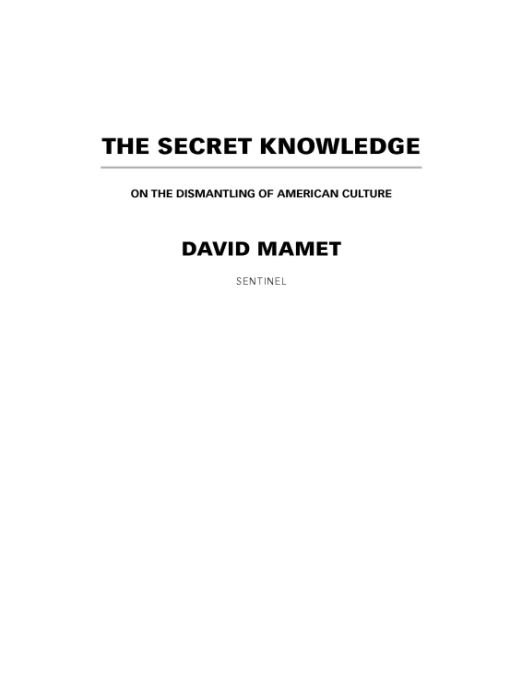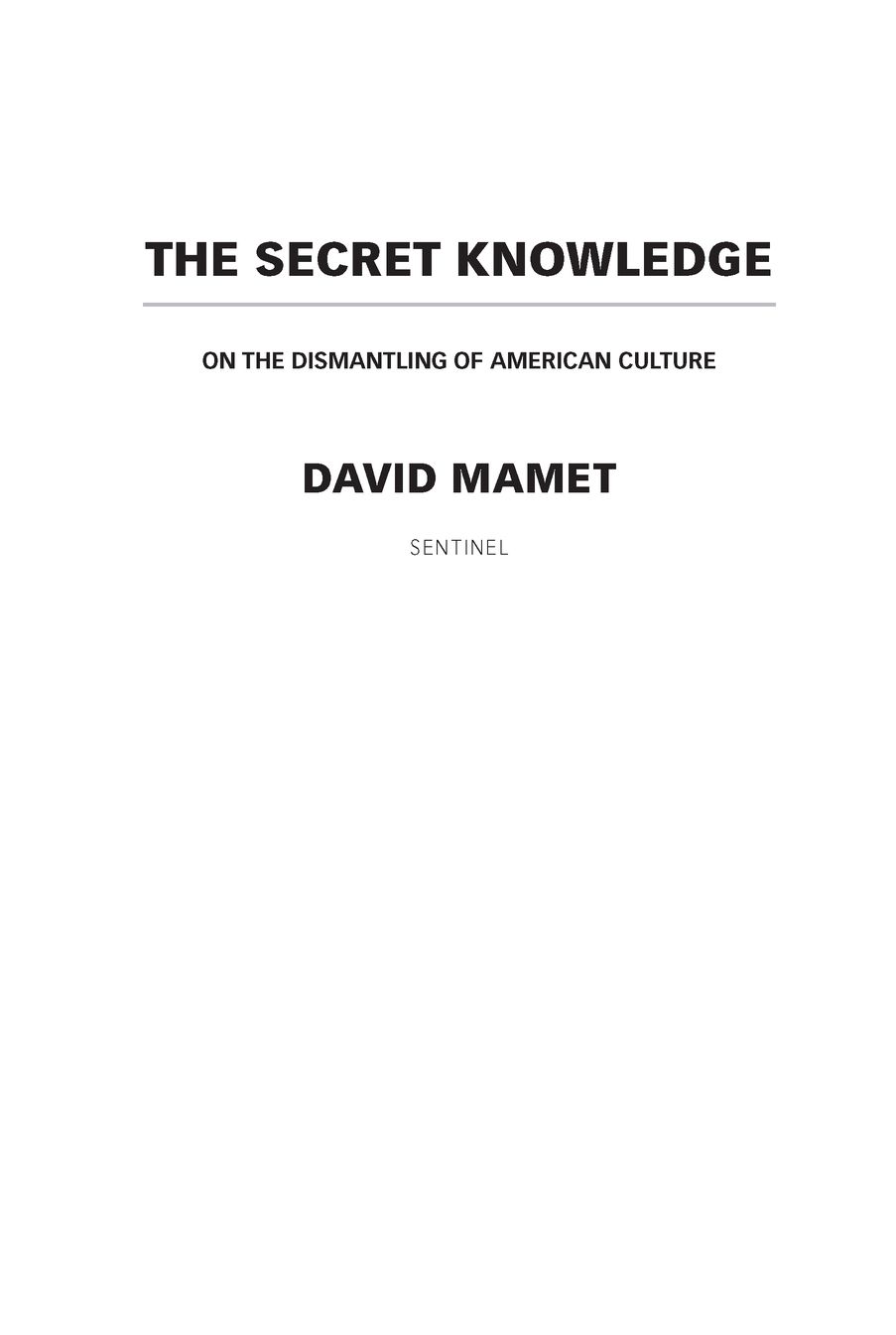The Secret Knowledge
Read The Secret Knowledge Online
Authors: David Mamet



Table of Contents
Â
Â
Â
SENTINEL
Published by the Penguin Group
Penguin Group (USA) Inc., 375 Hudson Street, New York, New York 10014, U.S.A. ⢠Penguin Group (Canada), 90 Eglinton Avenue East, Suite 700, Toronto, Ontario, Canada M4P 2Y3 (a division of Pearson Penguin Canada Inc.) ⢠Penguin Books Ltd, 80 Strand, London WC2R 0RL, England ⢠Penguin Ireland, 25 St. Stephen's Green, Dublin 2, Ireland (a division of Penguin Books Ltd) ⢠Penguin Books Australia Ltd, 250 Camberwell Road, Camberwell, Victoria 3124, Australia (a division of Pearson Australia Group Pty Ltd) ⢠Penguin Books India Pvt Ltd, 11 Community Centre, Panchsheel Park, New Delhiâ110 017, India ⢠Penguin Group (NZ), 67 Apollo Drive, Rosedale, Auckland 0632, New Zealand (a division of Pearson New Zealand Ltd) ⢠Penguin Books (South Africa) (Pty) Ltd, 24 Sturdee Avenue, Rosebank, Johannesburg 2196, South Africa
Â
Penguin Books Ltd, Registered Offices: 80 Strand, London WC2R 0RL, England
Â
First published in 2011 by Sentinel, a member of Penguin Group (USA) Inc.
Â
Â
Copyright © David Mamet, 2011All rights reserved
Â
LIBRARY OF CONGRESS CATALOGING IN PUBLICATION DATA
Mamet, David.
The secret knowledge : on the dismantling of American culture / David Mamet. p. cm.
Includes bibliographical references and index.
eISBN : 978-1-101-51535-8
1. Right and left (Political science)âUnited States. 2. Political cultureâUnited States. 3. United StatesâPolitics and governmentâ21st century. I. Title.
JK1726.M36 2011
320.51'30973âdc22 2010049347
Â
Â
Without limiting the rights under copyright reserved above, no part of this publication may be reproduced, stored in or introduced into a retrieval system, or transmitted, in any form or by any means (electronic, mechanical, photocopying, recording or otherwise), without the prior written permission of both the copyright owner and the above publisher of this book.
Â
The scanning, uploading, and distribution of this book via the Internet or via any other means without the permission of the publisher is illegal and punishable by law. Please purchase only authorized electronic editions and do not participate in or encourage electronic piracy of copyrightable materials. Your support of the author's rights is appreciated.
This book is dedicated to the memory of my father.
Most initiations are about the devolution of responsibility. At the same time, initiations often double as a long and confused moment of shared truths. Essentially, what the adults, elders, or senior members of the group share with the initiates is the knowledge they possess, and then they admit to a terrible secret, the secret of the “tribe”âthat beyond the knowledge the initiates have just been given there is no special knowledge.
âAnna Simons,
The Company They Keep
The Company They Keep
1
THE POLITICAL IMPULSE
All religions stem from the same universal needs. Each contains awe, obedience, grace, study, prayer, and submission. Each religion will order and stress these elements differently, but their root is the sameâa desire to understand the Divine and its intentions for humankind.
The political impulse, similarly, must, however manifested, proceed from a universal urge to order social relations.
Emotions may elevate practical partisan differences to the realm of the spiritual or doctrinal, which is to say, the irreconcilableâDemocrats, notably, are more likely to credit terrorists taken in battle against our country rather than Republicans, and many liberal Jews to believe the statements of Hamas rather than those of Israel.
In the election of 2008, environmental, social, and financial change were the concerns of both parties. The Right held that a return to first principles would arrest or re-channel this momentum toward bankruptcy and its attendant geopolitical dangers. It suggested fiscal conservatism, greater and more efficient exploitation of natural resources, lower taxes, a stronger military. The Left's view was to suggest that Change was good in itselfâthat a problem need not be dealt with mechanically (by acts whose historical efficacy was demonstrable) but could be addressed psychologically, by identifying “change itself” as a solution.
The underlying question, common to both sides, was how to deal with this problematic change; the Conservative answer, increased exploitation of the exploitable and conservation of needless expenditureâin effect, sound business practice; that of the Liberals a cessation of the same. Each were and are interested in Security, the Liberals suggesting détente and the Conservatives increased armament; each side was interested in Justice, the Conservatives holding it will best be served by the strict rule of law, the Liberals by an increase in the granting of Rights.
This opposition appealed to me as a dramatist. For a good drama aspires to be and a tragedy
must
be a depiction of a human interaction in which both antagonists are, arguably, in the right.
must
be a depiction of a human interaction in which both antagonists are, arguably, in the right.
My early plays,
American Buffalo
,
The Water Engine
,
Glengarry Glen Ross
, concerned Capitalism and business. This subject consumed me as I was trying to support myself, and like many another young man or woman, had come up against the blunt fact of a world which did not care.
American Buffalo
,
The Water Engine
,
Glengarry Glen Ross
, concerned Capitalism and business. This subject consumed me as I was trying to support myself, and like many another young man or woman, had come up against the blunt fact of a world which did not care.
I never questioned my tribal assumption that Capitalism was bad, although I, simultaneously, never acted upon these feelings. I supported myself, as do all those not on the government dole, through the operation of the Free Market.
As a youth I enjoyedâindeed, like most of my contemporaries, reveredâthe agitprop plays of Brecht, and his indictments of Capitalism. It later occurred to me that his plays were copyrighted, and that he, like I, was living through the operations of that same free market. His protestations were not borne out by his actions, neither
could
they be. Why, then, did he profess Communism? Because it sold. The public's endorsement of his plays kept him alive; as Marx was kept alive by the fortune Engels's family had made selling furniture; as universities, established and funded by the Free Enterprise systemâwhich is to say by the accrual of wealthâhouse, support, and coddle generations of the young in their dissertations on the evils of America.
could
they be. Why, then, did he profess Communism? Because it sold. The public's endorsement of his plays kept him alive; as Marx was kept alive by the fortune Engels's family had made selling furniture; as universities, established and funded by the Free Enterprise systemâwhich is to say by the accrual of wealthâhouse, support, and coddle generations of the young in their dissertations on the evils of America.
We cannot live without trade. A society can neither advance nor improve without excess of disposable income. This excess can only be amassed through the production of goods and services necessary or attractive to the mass. A financial system which allows this leads to inequality; one that does not leads to mass starvation.
Brecht, an East German, was allowed by the Communists to keep his wealth and live at his ease in Switzerlandâa show dog of Communism. His accomplishments, however, must be seen not as an indictment, but as a ratification of the power of free enterprise. As must the seemingly ineradicable vogue for the notion of Government Control.
The free market in ideas keeps this folly as current as any entertainment reviled by the Left as “mindless.” But the fiction of top-down Government Control, of a Command Economy, is, at essence, like a Reality Show, which is to say, a fraud. The Good Causes of the Left may generally be compared to NASCAR; they offer the diversion of watching things go excitingly around in a circle, getting nowhere.

Who does not want Justice? Each of us, of course, wants justice for himself, and all but the conscienceless few realize that we deserve well from each other.
The question is one of apportionment, for justice cannot be infinite. There is a finite amount of time, knowledge, wisdom, and moneyâand to tax the mass endlessly, even in the pursuit of justice, must cause injustice somewhere.
One may be just to the trees of the Northwest, impoverish loggers, and raise the cost of home construction; if all prisoners are allowed unlimited and endless access to all courts, whose time and energy is as finite as every other thing, the court system must stint other applicants. One may extend Justice to the snail darter and cripple the Port of New York; and a legitimate aversion to racial profiling may not only inconvenience but mortally endanger the traveling public.
My revelation came upon reading Friedrich Hayek's
The Road to Serfdom
. It was that there is a cost to
everything,
that nothing is without cost, and that energy spent on A cannot be spent on B, and that this is the meaning of
cost
âit represents the renunciation of other employments of the money. He wrote that there are no solutions; there are only tradeoffsâmoney spent on more crossing guards cannot be spent on books. Both are necessary, a choice must be made, and that this is the Tragic view of life.
The Road to Serfdom
. It was that there is a cost to
everything,
that nothing is without cost, and that energy spent on A cannot be spent on B, and that this is the meaning of
cost
âit represents the renunciation of other employments of the money. He wrote that there are no solutions; there are only tradeoffsâmoney spent on more crossing guards cannot be spent on books. Both are necessary, a choice must be made, and that this is the Tragic view of life.
Other books
Undeniable by Madeline Sheehan
Loving Liam (Cloverleaf #1) by Gloria Herrmann
The Zimmer Doctrine (Corps Justice Book 11) by Cooper, C. G.
Always Upbeat / All That by Stephanie Perry Moore
Twisted by Jo Gibson
Turn Me Loose by Frank X Walker
Take Me by Locklyn Marx
Lucas: The Hunter Brothers Series by L.J. Dee
Mount Terminus by David Grand
A Bit on the Side by William Trevor